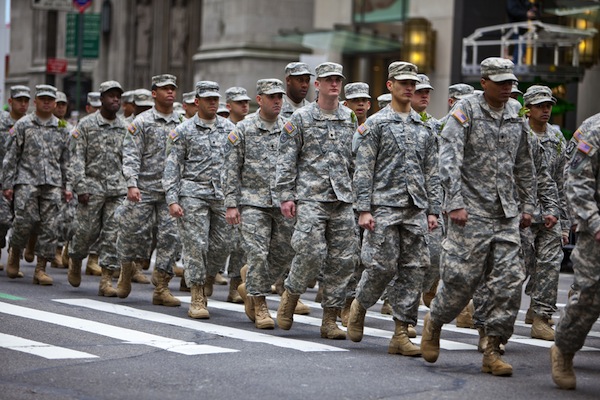General Dempsey: Improved Relations Needed between Soldiers and Civilians

 Stuart Monk / Shutterstock.com
Stuart Monk / Shutterstock.com
July 1 marked the 40th anniversary of the modern, all-volunteer military. To commemorate the day, Secretary of Defense Chuck Hagel issued a statement saying:
"In commemorating the birth of our modern military, we recognize and thank the millions of men and women and their families who have served our country – on active duty, in the reserves, and in the National Guard. Skeptics and detractors claimed an all-volunteer force could not be sustained, but these remarkable Americans proved otherwise. They helped win the Cold War, stood against aggression in the Persian Gulf, kept peace in the Balkans, and put their lives on the line in Iraq and Afghanistan in the years since 9/11. They choose to serve our country because they believe in a cause that is bigger than themselves. They’ve always put the interests of the nation first, as have their families. It’s because of their sense of duty that the American military remains the most trusted institution in our society today.Our all-volunteer force faces challenges. It will need to rebalance, adapt, and evolve, as it has over the last 40 years."
Facing those challenges often creates a rift between the military and the civilian community it must coexist with. After more than a decade at war, it's clear that times have changed since the Greatest Generation of World War II, with victory gardens, war bonds, and the entire country feeling like they have a stake in the ongoing war efforts.
Today, the only interaction that many in the country have with the military is the nightly news reports of casualties or when Internet stories of heroism go viral.
On July 3, chairman of the Joint Chiefs of Staff, General Martin Dempsey, authored an opinion piece in the Washington Post applauding the accomplishments of this all volunteer force and calling for improved relations between the military and the civilian world. In the piece Dempsey wrote:
"The establishment of a professional military composed entirely of volunteers is one of our nation’s finest achievements. It’s been so effective that we often take it for granted."
"The last decade of war has affected the relationship between our society and the military. We can’t allow a sense of separation to grow between us," he added.
While it is true that today's returning soldiers have not had to endure the taunts of "baby killer" that Vietnam veterans did, there is still a mentality of "us" and "them" between the military and the civilian world -- a mentality that goes both ways. Those in the civilian world who have no experience with the military often struggle to understand it's unique culture and challenges.
There is still a lack of dialogue and understanding between those who fight the battles and those left behind to enjoy the freedoms soldiers fight for. It's nearly impossible for a civilian to understand the experience of the soldier. This is why it's imperative, as Dempsey says in his article, that we listen to our veterans. Along with the horror stories of near misses and comrades lost will also come stories of pride and courage.
However, Dempsey also says that those in the military have a duty to improve these relations as well.
"We should tell our stories and recognize that those who aren’t in uniform might not know what to say or ask," he said. "We also have a duty to listen. Our fellow citizens may have different perspectives that we need to hear and understand."
There comes a time when every returning soldier will eventually return to the civilian world from which he or she came. To this, Dempsey says:
"We must also keep faith with one another. Many of our warriors have paid a high price and need lasting support. The invisible wounds of war can linger for decades, and physical wounds often require long rehabilitations. All our veterans deserve the opportunity to contribute to society once out of uniform."
It's important to note that throughout the history of the United States military, less than 40 years saw an active draft. An all-volunteer force has been the norm since 1787, except during times of conflict or emergency.



